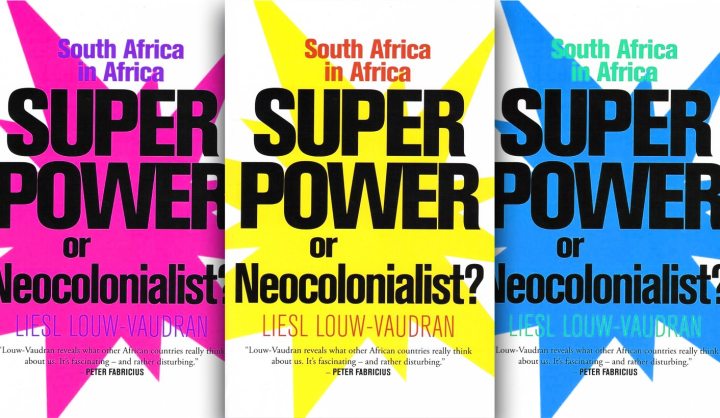Africa, South Africa
Book review: Does South Africa have a foreign policy?

In a new book, veteran Africa correspondent Liesl Louw-Vaudran tries to explain South African foreign policy, especially as it manifests on the African continent. Her conclusion? We don’t really have one. It’s hard to disagree. By SIMON ALLISON.
“Does South Africa have a foreign policy?”
I get this question a lot. As an Africa correspondent, from South Africa, I’m often presumed to have some kind of insight into why South Africa’s diplomats do what they do. Because no one else – not politicians, not businessmen, not researchers, and certainly not fellow diplomats – can figure it out.
There is a theoretical answer to the question, of course. In his seminal Foreign Affairs article, published in 1993, Nelson Mandela laid out his vision of how South Africa should interact with its African neighbours, and the world. The vision was centred on the promotion and protection of human rights, and was supposed to be the blueprint for how South Africa acted on the international stage. Thabo Mbeki built on this with a strong rhetorical commitment to pan-Africanism and the “African Renaissance”, while the National Development Plan under Jacob Zuma outlines key foreign policy focusses, including strengthened multilateralism, improving human security, and the national interest.
But the gap between the theory and the practice of South Africa’s foreign relations is vast. While there are many examples to choose from, the most egregious in recent months is South Africa’s decision not to nominate Nkosazana Dlamini-Zuma for a second term as chairperson of the African Union Commission – a term she certainly would have won.
It was only four years ago, remember, that South Africa used its considerable influence on the continent to bully and browbeat other countries into voting for Dlamini-Zuma in the first place, ostensibly to reform and rejuvenate the continental body. The bruising incident caused considerable damage to South Africa’s standing on the continent, the repercussions of which are still being felt in Addis Ababa, the home of the African Union, today.
But this time around, South Africa’s foreign policy calculations appear to have changed. Even though a second term for Dlamini-Zuma is there for the taking, we don’t seem to want it any more. The cynics who suggested all along that Dlamini-Zuma’s deployment to Addis was more about domestic politics than foreign policy appear to have been right all along.
So, when asked, I struggle to answer the question: no, I don’t know if South Africa has a consistent foreign policy. No one analysis seems to explain the country’s actions. It’s not just about human rights promotion, otherwise we wouldn’t keep abstaining from voting for basic freedoms at the Human Rights Council. It isn’t just about driving the African Renaissance, otherwise we would keep Dlamini-Zuma where she is. It isn’t just about promoting South Africa’s commercial interests, otherwise we would have acted a lot quicker and more forcefully to prevent Zimbabwe from spiralling out of control. And it isn’t just about domestic politics, otherwise we wouldn’t spend so much time and effort on projecting South Africa as a continental superpower.
In her new book, South Africa in Africa: Superpower or Neocolonialist, long-time Africa correspondent Liesl Louw-Vaudran comes to much the same conclusion. Drawing on extensive first-hand reporting of the people and places that have dominated the African Agenda, she tells the tale of how the new South Africa – after decades of isolation – has hesitantly, awkwardly, at times aggressively tried to flex its foreign policy muscles. As she recounts, in light and compelling prose (journalists know how to tell stories), foreign policy has been a fraught, contested space for each successive president, and none has emerged with a blemish-free record.
She observes: “Despite many lofty speeches and policy documents, there is no clear indication of where South Africa is headed in terms of its foreign policy in Africa. To continue acting as a superpower it would have to be a champion for democratic principles and fight for human rights. Officials repeatedly emphasise South Africa’s commitment to these values when it comes to foreign policy. Yet, so far, the emphasis has been more on solidarity with the continent, on pursuing the so-called African Agenda and at the same time taking a decidedly anti-Western stance on many issues.”
What lends Louw-Vaudran’s account an authenticity sometimes missing from more academic efforts is her presence as an eyewitness to the events she now recounts. When South Africa was mediating between Congolese government and rebel groups, she was there. When Thabo Mbeki went to Timbuktu, a visit that inspired him to rescue the famous Timbuktu manuscripts, she was there. When Dlamini-Zuma first competed for the top job at the African Union, in Addis in January 2012, she was there, just as she was in Kigali when Dlamini-Zuma’s term officially expired earlier this month (although Dlamini-Zuma will stay in charge until a new candidate is elected).
This is a fascinating read. It’s useful, too. Next I am asked if South Africa has a foreign policy, I’m not going to try to answer. Instead, I’ll just refer the enquirer to Louw-Vaudran’s book, which tells you pretty much all you need to know on the subject. DM


















 Become an Insider
Become an Insider